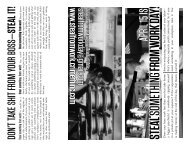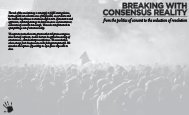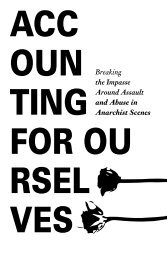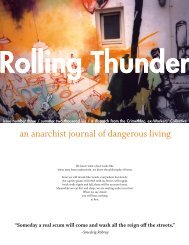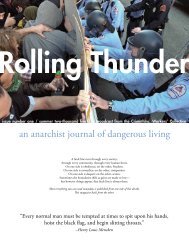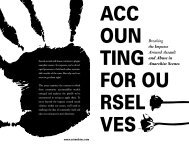HEiST! - CrimethInc
HEiST! - CrimethInc
HEiST! - CrimethInc
You also want an ePaper? Increase the reach of your titles
YUMPU automatically turns print PDFs into web optimized ePapers that Google loves.
the time.” Among piece-rate workers altruism<br />
is rare. Even in making homers, aid without a<br />
return is inconceivable. But it is not a matter of<br />
like for like: no one calculates how much his<br />
help is worth, or the time spent on it. Sometimes<br />
one can even come across selflessness without<br />
any expectations of recompense – which could<br />
never happen in “real” work. Most friendships<br />
begin with the making of a joint homer.<br />
These different joys are obviously marred by<br />
the knowledge that they are only the joys of an<br />
oasis in a desert of piece-rate work. Slowly, the<br />
factory returns to itself, the computer dries out<br />
the oasis, the pressures of production continue<br />
unchanged. Despite this, everyone is cheerful<br />
during these few precious minutes. This is manifestly<br />
obvious to all but the bosses – who don’t<br />
need to worry about the constant bad temper of<br />
piece-rate workers except insofar as it relates to<br />
production; and who don’t display the least understanding<br />
of this loophole to happiness, not<br />
even as a matter of tactics. A foreman’s anger<br />
is a sure indication of the happiness which the<br />
worker sows with a homer.<br />
I am convinced that homers carry a message.<br />
“Artisanal tinkering, survivals from a dying industry:<br />
if homers are a negation, then they are<br />
only a nostalgia for the past.” This might be said<br />
if you didn’t grasp the importance of homers for<br />
workers on piece-rates. In fact, they don’t know<br />
the old handicrafts any more and they detest<br />
the private customers for whom they often do<br />
black market labor after factory hours.<br />
Workers would gladly renounce the artisan<br />
character of homers, but they have no other<br />
way to assert themselves over mechanized<br />
labor. Similarly, they would gladly produce<br />
things which made sense, but the production<br />
of senseless homers is their only chance to free<br />
themselves, for a few minutes, from the “good<br />
sense” of the factory. They would gladly manufacture,<br />
often collectively, things which were<br />
Unlike our industrial counterparts, most of us<br />
have been ignored by organized labor. We are<br />
excluded from collective bargaining by assertions<br />
that our work is too precarious, that we<br />
can’t be expected to stick around long enough,<br />
that our workplaces are too small. Yet when<br />
we confess to our more securely employed acquaintances<br />
that we work for minimum wage,<br />
we never fail to hear the refrain, “Sounds like<br />
y’all could use a union.” Not that we morn the<br />
official union’s lack of interest in our exploitation.<br />
We don’t need more boredom, bureaucracy<br />
and control in our already stifled, suppressed<br />
lives. But we could do with a bit more money at<br />
the end of the month, a few more groceries in<br />
our pantries, a dose of complicity in our friendships,<br />
and a sprinkling of agency in the places<br />
where we spend most of our waking hours.<br />
In the absence of a formal organization with<br />
pretensions of representing our interests, we are<br />
forced to supersede the union form and take directly<br />
for ourselves that which we are denied<br />
by the market. Along with workplace sabotage,<br />
slacking off instead of hustling, and the occasional<br />
sick day when it is just too beautiful<br />
outside, workplace theft constitutes our everyday<br />
practice of class struggle, our faceless resistance.<br />
Even those of us who work for “responsible,”<br />
“ethical” businesses find ourselves looking<br />
for ways to take home some extra food or<br />
to slip some bills out of the register. And when<br />
we can, we give freely of the commodities we<br />
produce, transforming them from objects with<br />
value (a price tag) to objects for free use (nourishment,<br />
intoxication, fun…). In this way, we<br />
subvert the commodity form on a daily basis by<br />
giving free food and drinks to our friends, but<br />
we do it in a limited and isolated manner.<br />
The Team is an attempt to coordinate and<br />
elaborate that subversion: to spread it beyond<br />
the circumscribed boundaries of friendship<br />
while at the same time creating new relationships<br />
based on a common material condition,




